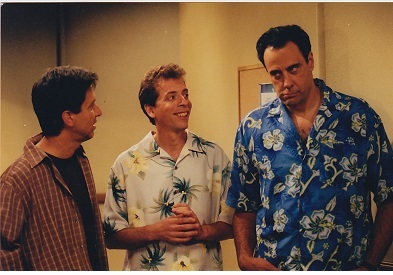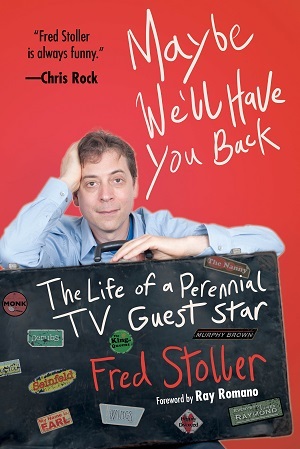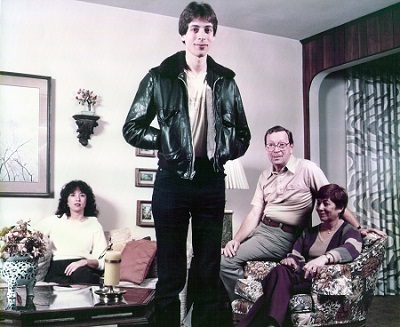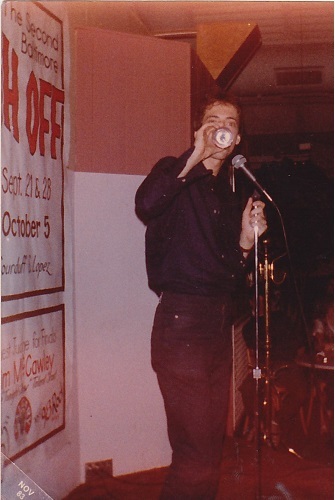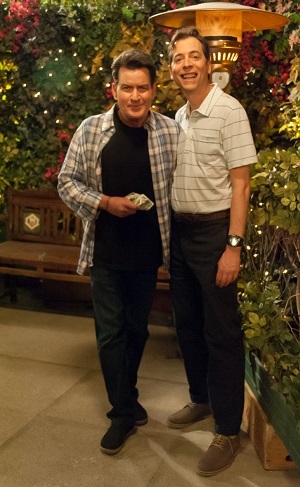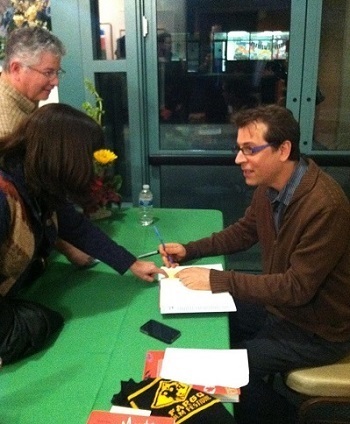Fred Stoller is one funny guy. He wrote the book on character acting (literally -- it's called Maybe We'll Have You Back: The Life of a Perennial TV Guest Star), and now he's returning to his roots as a stand-up comic, with shtick familiar to anyone who's caught his appearances on Seinfeld, Friends, Everybody Loves Raymond, or Murphy Brown -- in a word, everybody.
"When I go into an audition, they say, 'not so pathetic' and I'm being myself. I always play that nebbishy, shmucky and pathetic guy."
Now "shtick," a Yiddish word for gimmick, belies that other word of central European origin Fred often uses: "nebbish," an unflattering term meaning a hapless and meek. But an ability to withstand the constant ups and downs of show business, and earn praise and lifelong friendships among comedy's most successful stand-ups working today, doesn't make a nebbish -- or does it?
"I'm always on eggshells being the guest -- I have to be on my best behavior if I want to be brought back," says Stoller. "I can't afford the luxuries the regulars have and flub a line, be late, not get a big laugh where I'm supposed to, or even converse with the stars when they don't want to be bothered by the guests."
Perhaps that nervousness of being a perennial guest looking to land somewhere has added something to the array of not very self-assured characters Stoller plays, which already seemed to come so naturally to him.
"That's part of his charm. His self-deprecating is real, he ain't doing it for affect," comedian and friend Dom Irrera told us.
"It's what makes him so friggin' funny, and is part of his likeability. Fred's never going to bullshit you. He can't, he's bullshit proof."
Stoller is instantly recognizable as "that guy" from his innumerable guest appearances on Everybody Loves Raymond, King of Queens, Sabrina, Wizards of Waverly Place, and more. Once a staff writer on Seinfeld, he survived a year of Larry David's berating, and in 2011 wrote and starred in the semi-autobiographical feature, Fred and Vinnie. But it's Stoller's idiosyncratic humor which has been getting him noticed since he first stepped on a stage to perform stand-up comedy in the '80s.
"To guys like me and [Adam] Sandler, who were just starting out, Fred was a big star." Chris Rock told us. "I still remember Fred's act, from start to finish, and whenever I hang out with Eddie Murphy for any extended period of time, he always asks me, 'What's Freddy Stoller doing?'"
If Eddie is curious, Stoller has been back in front of crowds, making people laugh again, thanks to the Jewish Book Council, which has "booked" the once itinerant road comic turned actor to appear at book festivals all over the country.
"I'm able to combine material with conversational stuff about shows I've been on and my exploits as a Seinfeld writer," Stoller said. "I'd been away close to 17 years and never thought I'd love it again."
"Fred is much better than he thinks he is, said Irrera."He's just got this deadpan rhythm. "My mother's always telling me my brother's better than me in this, and better than me in that...I don't even have a brother." You can't be that good and not know it and only reason his stand-up career was held back because he was such a successful actor."
They say the best thing a parent can teach their child is confidence, so it's a miracle Stoller ever left home. Raised in a middle-class Jewish home in Sheepshead Bay, Brooklyn, the pathologically shy Stoller saw stand-up comedy as way to break into character acting and crafted a routine at his last year at summer camp. His father, Morris Stoller, had fought in WWII as a rifleman at Anzio, and was severely wounded by shrapnel in Southern France.
"My father wasn't mute, but he hardly spoke more than two sentences in a row," said Stoller. "He'd always come home after designing displays for department stores in Manhattan and sit two feet away from the TV with a Martini in his hand."
Medicine specialist, radio and television personality, and one of Fred's biggest champions, Dr. Drew Pinksy, recently told us:
"[Fred's] dad probably had pretty severe Post Traumatic Stress Disorder because of the war. On the podcast recently with me and Adam [Carolla], Fred said that his father would pretend to be reading and would look over his shoulder and realize it was a blank page."
Where Morris Stoller was short on words, Fred's mother, Pearl Stoller, contributed to enough household chatter and hysteria to inform her youngest child's fragile temperament but also supply him with endless fodder for his future stand up bits.
"My husband was an artist, and Freddy likes to say he's creative from his father and a neurotic like me," Pearl Stoller told us.
"He was different as a child. I worried that he needed individual attention, so I sent him to private school, and he hated it. My daughter Cindy was outgoing, had many friends, and Freddy was just a loner. I told him to go out and play and he'd rather stay home and play with clothes pins, GI Joe's. and act out the parts to Fiddler on the Roof."
While most Brooklyn teenaged boys were shouting "Attica, Attica," a la Al Pacino, Stoller would dream of playing Dog Day Afternoon's outcast characters like Gary Springer's gun-shy knucklehead, Stevie, who chickens out at the beginning of the bank robbery and asks to go home.
"I grew up watching Barney Miller, and thought, 'I could be one of those guys in the station or a Sweat Hog on Welcome Back Kotter," said Stoller.
"I didn't have the confidence that I could be a star, but I related to those weirdo guys who popped up with three lines. So, I guess be careful what you wish for, because that's what I ended up becoming."
It did, however, take tremendous initiative for Stoller to hop the D Train from Coney Island to Time Square and audition for a performing slot at the famed Improvisation.
"My jokes were not sophisticated," Stoller said. "I talked about pay toilets. I said, 'They should make it that you have to pay to get out, because anyone would pay to get out of there with that smell.' I came up with this routine and, with nothing to lose, tried it out. 'My friend told me that he was at a party, and he ate so many cookies, "it wasn't even funny." Does that mean eating cookies is usually funny, but not in his case?' And then I took out some cookies and proceeded to eat them as I waited and got a few laughs. When I got off stage, another comedian said, 'You eating cookies, now that was funny. You did that funny.'"
Still, the rejection was too much to handle, and he put comedy on the back burner. The next few years consisted of an unsuccessful stab at higher education at Kingsborough Community College, as well as a slew of unsatisfying part-time jobs, including a stint as The Wolfman in Coney Island's "Tunnel of Laughs" ride, working at Toys "R" US, and selling knishes on the beach. Stoller, however, somehow mustered enough resolve to make it back to The Improvisation to audition and the club's manager, Chris Albrecht (the former head of HBO), encouraged him to hang out there. He used that foot-in-the-door to explore other performing opportunities around the city.
"I remember Freddy would come home from Catch a Rising Star at 2:30 in the morning, and we'd be up waiting for him," said Pearl Stoller. "He'd tell me he was going to acting school when he was really performing at these comedy clubs in New York City."
Those last three years at home and his mother's kvetching were enough to keep the comedy hopeful plied with enough material (his mother actually said, "You're so depressed, how you going to make people laugh?") to break him into Manhattan's comedy clubs. Not only did Stoller move out of his parents home but steadily carved out a niche for himself and made life-long friends with the once-budding comics who still enjoy talking about him today.
"Fred was a big act at Catch a Rising Star, and we had a lot of fun together," said Irrera, who met Stoller in the early '80s. "One time Fred and I and this comedian named Jack Coen were driving to Buffalo -- Jack looked like James Dean, me with the goomba look, and Fred with that Of Mice and Men Lenny look. We couldn't find the directions and we kept saying, 'Freddy, are you sure you don't have them?' Finally he says, 'Oh, here they are,' and pulls it out of his bag. So I say to Jack, 'Pull over.' So Jack pulls Fred out of the car, and we pretend to start beating him up ... and it looked pretty good from a distance. Then this car pulls off from the passing lane, screeches to a halt, and a guy comes running toward us and we say, 'It's alright we're comedians.'"
It's a matter of course in the life of any ambitious comic to relocate to Hollywood. Stoller's turn to head west was precipitated by a writing job on the short-lived Nightlife with David Brenner, which helped get him an agent at William Morris. He arrived in time for pilot season in 1988 and has never left.
Hollywood is deserving of its reputation for superficiality, but for those talented and untalented souls who willingly sign up for years of soul-crushing rejection there should be afforded government-supported counseling for PTSD, or LASD.
"The reason Mel Brooks started to suck in 1980 and Woody Allen didn't was because Mel Brooks moved to LA," said comedian and radio personality Artie Lange, who met Stoller while working with him on TV's Norm. "It's an extreme example, but you lose your edge out there."
Stoller himself may be his worst PR man, but others have typically recognized his worth. Larry David gave him a staff job as a writer on Seinfeld. Though the gig lasted only a season, there was enough material for his e-book, My Seinfeld Year.
"When I started doing the sitcom Norm, Norm [MacDonald] said 'I want comics like Fred Stoller on my show,'" Lange told us. "He booked Fred for a couple of episodes, and we started going for dinners and movies. My mother loved Fred from Everybody Loves Raymond, and I would tell her stories about Fred's mom calling to ask him, 'Are you still out there and not doing anything? I don't know what to tell my friends I just tell them that you're dead now.' (laughs) Stuff like that, especially coming from him, is amazing."
"My book's about the quest to be a regular and looking for a home in show business and in life," said Stoller. "All my life, I've been asking for permission to express myself as a writer. It is fun being on sets, but I want to write more in my voice. The book has changed me in more ways than one."
In his life, too, there is more than one plot line. There's the obvious Hollywood saga, then there's his internal struggle or the endless jokes about his lifelong war of attrition with his mother -- a matter for the DSM-IV -- on which Dr. Drew Pinksy provided additional insight.
"He certainly uses it to his professional advantage, and it's clearly an amplification of almost every mother/son relationship," said Pinsky, the first medical professional, to date, to use celebrity data for scholarly literature, after conducting trauma and addiction inventories with his talk show guests.
"I'm not clear whether he's going into a pit of self-loathing to get a reaction. It always has a humorous tag on it though, so it feels a little bit like he is in control and always comes out of it with a smile."
These days, if he's not out promoting the book, Stoller is out at Flappers Comedy Club in Burbank or The Comedy and Magic Club in Hermosa Beach, where he's back to honing the act he'd forsaken in the late nineties.
"I suppose I had some shame issues about being a stand-up. Comics had lonely lives, were sleazy. Perhaps my twenties and early thirties were my most depressed times and I associate it with that. I hated it in the New York clubs where there were no spots given out and still have nightmares I'm there waiting all night to be picked. Now I just go to clubs where I'm appreciated."
Stoller will be Norm MacDonald's guest at CapCity Comedy Club in Austin, Texas, June 4th-7th.
Click here to read the longer version.


